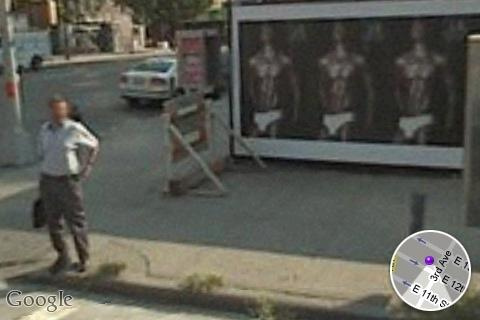This error was revealed and written up by Fred Beneson and first published on his blog.
After receiving criticism for the privacy-violating “feature” of Google Street View that enabled anyone to easily identify people who happened to be on the street as Google’s car drove by, the search giant started blurring faces.
What is interesting, and what Mako would consider a “Revealing Error”, is when the auto-blur algorithm can not distinguish between an advertisement’s face and a regular human’s face. For the ad, the model has been compensated to have his likeness (and privacy) commercially exploited for the brand being advertised. On the other hand, there is a legal grey-area as to whether Google can do the same for random people on the street, and rather than face more privacy criticism, Google chooses to blur their identities to avoid raising the issue of whether it is their right to do so, at least in America.
So who cares that the advertisement has been modified? The advertiser, probably. If a 2002 case was any indication, advertisers do not like it when their carefully placed and expensive Manhattan advertisements get digitally altered. While the advertisers lost a case against Sony for changing (and charging for) advertisements in the background of Spiderman scenes located in Times Square, its clear that they were expecting their ads to actually show up in whatever work happened to be created in that space. There are interesting copyright implications here, too, as it demonstrates an implicit desire by big media for work like advertising to be reappropriated and recontextualized because it serves the point of getting a name “out there.”
To put my undergraduate philosophy degree to use, I believe these cases bring up deep ethical and ontological questions about the right to control and exhibit realities (Google Street View being one reality, Spiderman’s Time Square being another) as they obtain to the real reality. Is it just the difference between a fiction and a non-fiction reality? I don’t think so, as no one uses Google maps expecting to retrieve information that is fictional. Regardless, expect these kinds of issues to come up more and more frequently as Google increases its resolution and virtual worlds merge closer to real worlds.
